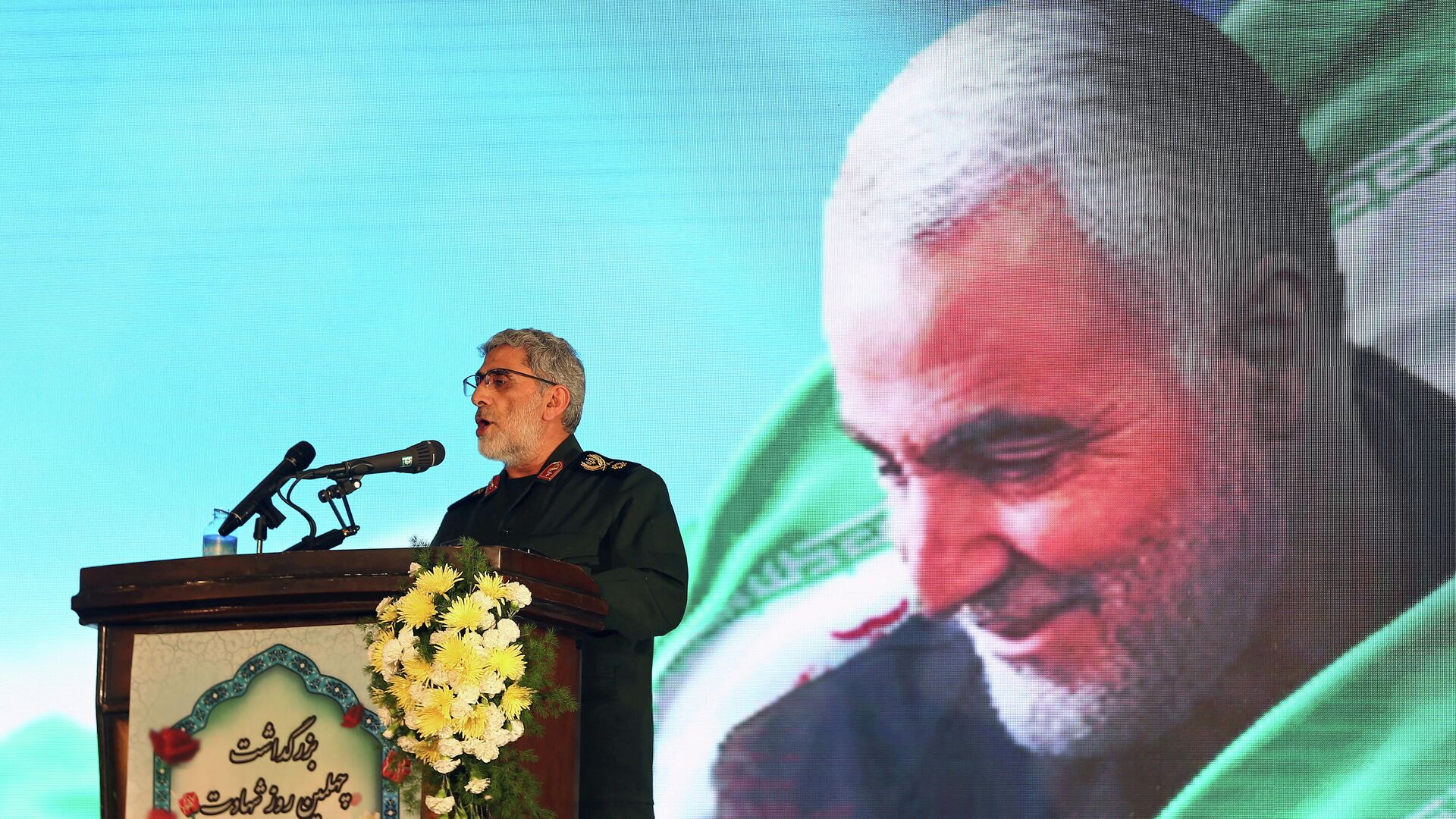IRGC Quds Force Chief: US May Face Revenge For Soleimani’s Assassination at Home - Report

© REUTERS / WANA
Subscribe
The assassination of Soleimani by the US military has had a significant aggravating impact on relations between Tehran and Washington, as he was an extraordinary figure with influence stretching far beyond the military field. At home, Soleimani was seen as a representation of outstanding human qualities and staunch will in the fight against Daesh*.
Esmail Qaani, commander of the elite Revolutionary Guard Quds Force and Soleimani's successor, says that Iran is still determined to retaliate for Soleimani’s death and the "ground for hard revenge" would come from the inside.
"We do not need to be present as supervisors everywhere, wherever is necessary we take revenge against Americans by the help of people on their side and within their own homes without our presence," Qaani said, as cited by Tasnim.
Qaani called on the US to act “wise” and to prosecute those who participated in the assassination of the general before the "children of the Resistance Front take the matter in their own hands and take revenge from the Americans by themselves.”
On 8 January, Iranian authorities imposed sanctions on 51 American citizens involved in the operation. All of them were said to participate “in the decision-making, planning, organisation, financing, support, as well as in the leadership or implementation of the terrorist act."
Among the officials are Chairman of the US Joint Chiefs of Staff Mark Milley, head of US Central Command (CENTCOM) Kenneth F. McKenzie Jr., and former National Security Adviser Robert C. O'Brien.
Among other things voiced by Iranian officials on the anniversary, was another call to put former President Trump on trial and punish him “in accordance with God’s command,” as well as other individuals responsible for Soleimani’s death.
What Does Iran Mean by ‘Revenge’?
According to several statements made by top Iranian officials, the “revenge” they refer to is mainly believed to be a gradual reduction of US influence in the Middle East, which is already taking place. Earlier on Saturday, Consul General of Iran in Afghanistan Majid Sadeghi Davlatabadi noted that Soleimani has become the cause of the US’ defeat in Iraq and Afghanistan.
“The ideological concept of Qasem Suleimani, who fought against Daesh, a project of the US and its allies, not only eradicated this sinister phenomenon in Islamic countries, but also caused the defeat and shame of the United States in Iraq and Afghanistan,” he said.
According to IRGC Spokesman Ramezan Sharif, “the first recompense that the Americans must pay for the assassination of Martyr Soleimani is to leave the region in humiliation.”
“Just as the Americans left Afghanistan with humiliation, they must leave other regional countries,” he said.
Before and After the Assassination
On 3 January 2020, Islamic Revolutionary Guard Corps (IRGC) General Qasem Soleimani, commander of the Quds Force, was assassinated in a targeted US drone strike while his car was departing the Baghdad International Airport, a move directly approved by then-US President Donald Trump.
The latter claimed that IRGC forces, led by Soleimani, attacked a US military base in Kirkuk, Iraq, and planned to storm four US embassies some days earlier. Later, then-Defense Secretary Mark Esper said he never saw evidence of a threat against the embassies.
Mark Esper on CBS: I didn't see the intelligence about Iran posing an imminent threat to 4 US embassies, but I believe President Trump when he says there was one pic.twitter.com/pAaMVXGAde
— Aaron Rupar (@atrupar) January 12, 2020
The operation of 3 January exacerbated US-Iranian relations, which were already particularly strained under the Trump administration after the latter decided to withdraw from the nuclear deal (also known as the Joint Comprehensive Plan of Action) and reestablish a harsh sanctions regime.
The operation stirred up a great turmoil in the region, with Tehran responding by launching missile attacks on two US military bases in Iraq - the Ayn al-Assad base and the Erbil airbase - attacks that subsequently led to traumatic brain injuries of some 100 American soldiers.
Tehran repeatedly denounced the operation as a flagrant violation of international law. At the same time, the assassination had sparked further speculation of a possible military strike by Tehran, as many high-ranking Iranian officials pledged to avenge Soleimani’s death.
Tehran also stressed that it would be Iran who would determine the time and place for retaliation. On last year’s anniversary of his assassination, Iranian foreign minister Mohammad Javad Zarif promised that Tehran would "not rest" until it brings the people responsible for his killing to justice.
Debates over Trump's controversial decision continue unabated not only among the main political forces in the region, but also in the US. Many analysts found the decision to eliminate the mighty Iranian general tactically successful, but disproportionate in regard to the threat he posed. Some reports speculated that the option to kill Soleimani was only one among many presented to Trump so as to induce him to exercise more restraint.
The action was not only recognized as unlawful by the UN, but also criticized inside the US, with some lawmakers saying that the administration had no credible proof of a potential threat.
*Daesh (IS/ISIS) a terrorist organization banned in Russian and many other countries

